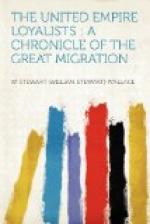INTRODUCTORY
The United Empire Loyalists have suffered a strange fate at the hands of historians. It is not too much to say that for nearly a century their history was written by their enemies. English writers, for obvious reasons, took little pleasure in dwelling on the American Revolution, and most of the early accounts were therefore American in their origin. Any one who takes the trouble to read these early accounts will be struck by the amazing manner in which the Loyalists are treated. They are either ignored entirely or else they are painted in the blackest colours.
So vile a crew the world ne’er
saw before,
And grant, ye pitying heavens, it
may no more!
If ghosts from hell infest our poisoned
air,
Those ghosts have entered these
base bodies here.
So sang a ballad-monger of the Revolution; and the opinion which he voiced persisted after him. According to some American historians of the first half of the nineteenth century, the Loyalists were a comparatively insignificant class of vicious criminals, and the people of the American colonies were all but unanimous in their armed opposition to the British government.
Within recent years, however, there has been a change. American historians of a new school have revised the history of the Revolution, and a tardy reparation has been made to the memory of the Tories of that day. Tyler, Van Tyne, Flick, and other writers have all made the amende honorable on behalf of their countrymen. Indeed, some of these writers, in their anxiety to stand straight, have leaned backwards; and by no one perhaps will the ultra-Tory view of the Revolution be found so clearly expressed as by them. At the same time the history of the Revolution has been rewritten by some English historians; and we have a writer like Lecky declaring that the American Revolution ’was the work of an energetic minority, who succeeded in committing an undecided and fluctuating majority to courses for which they had little love, and leading them step by step to a position from which it was impossible to recede.’
Thus, in the United States and in England, the pendulum has swung from one extreme to the other. In Canada it has remained stationary. There, in the country where they settled, the United Empire Loyalists are still regarded with an uncritical veneration which has in it something of the spirit of primitive ancestor-worship. The interest which Canadians have taken in the Loyalists has been either patriotic or genealogical; and few attempts have been made to tell their story in the cold light of impartial history, or to estimate the results which have flowed from their migration. Yet such an attempt is worth while making—an attempt to do the United Empire Loyalists the honour of painting them as they were, and of describing the profound and far-reaching influences which they exerted on the history of both Canada and the United States.




